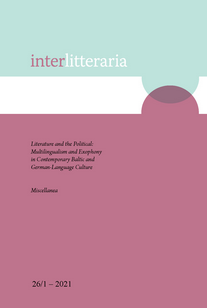Trauma, Narrative and History: Representation of Traumatic Experience in the Works of Algirdas Landsbergis
Trauma, Narrative and History: Representation of Traumatic Experience in the Works of Algirdas Landsbergis
Author(s): Gabija Bankauskaitė, Loreta HuberSubject(s): Lithuanian Literature, Individual Psychology, Psychoanalysis, Theory of Literature
Published by: Tartu Ülikooli Kirjastus
Keywords: trauma; occupation; exile; identity; alienation; spiritual starvation;
Summary/Abstract: The twentieth century witnessed an abundant number of traumatic events related to dark history. Trauma caused by war, occupation, exile, repression, gave rise to migration or mass murder. To rely upon Cathy Caruth (1996: 3), the concept of trauma is understood as a physical wound; however, subsequently in medicine and the literature of psychiatry, especially in Freud’s works, the concept of trauma came to be understood as a psychological wound. In addition, trauma is not only a disturbing or stressful experience that affects an individual physically or psychologically, it may also be based on other factors created by society. Over time the field of trauma in various contexts expanded so that today it is widely used in sociology when analysing historical and cultural events. Cultural traumatic memory is mirrored in trauma fiction that conveys the experience of loss and suffering, there is a space for memories, introspection, recollections, flashbacks and awful remembrances that are colored by pain. Apart from individual, event-based trauma, there is another category of trauma variously called cultural or historical trauma, which affects groups of people. Numerous studies have been conducted on the latter topic, however, trauma and its expression in Lithuanian literature has not yet been sufficiently documented. The aim of this study is to discuss the concepts of cultural and historical trauma and the way trauma is reflected in Algirdas Jeronimas Landsbergis’ works. The authors of the study claim that Landsbergis – one of many Lithuanian writers-in-exile – wrote texts that fill a cultural vacuum and invite a re-discussion of what was most painful in the past.
Journal: Interlitteraria
- Issue Year: XXVI/2021
- Issue No: 1
- Page Range: 309-323
- Page Count: 15
- Language: English

